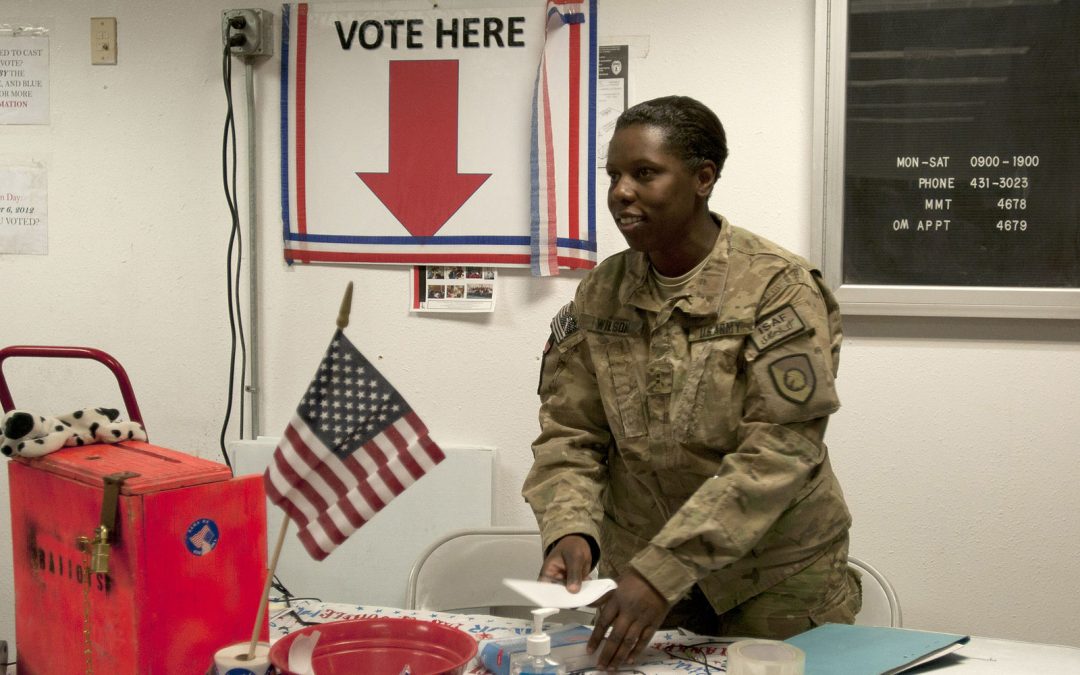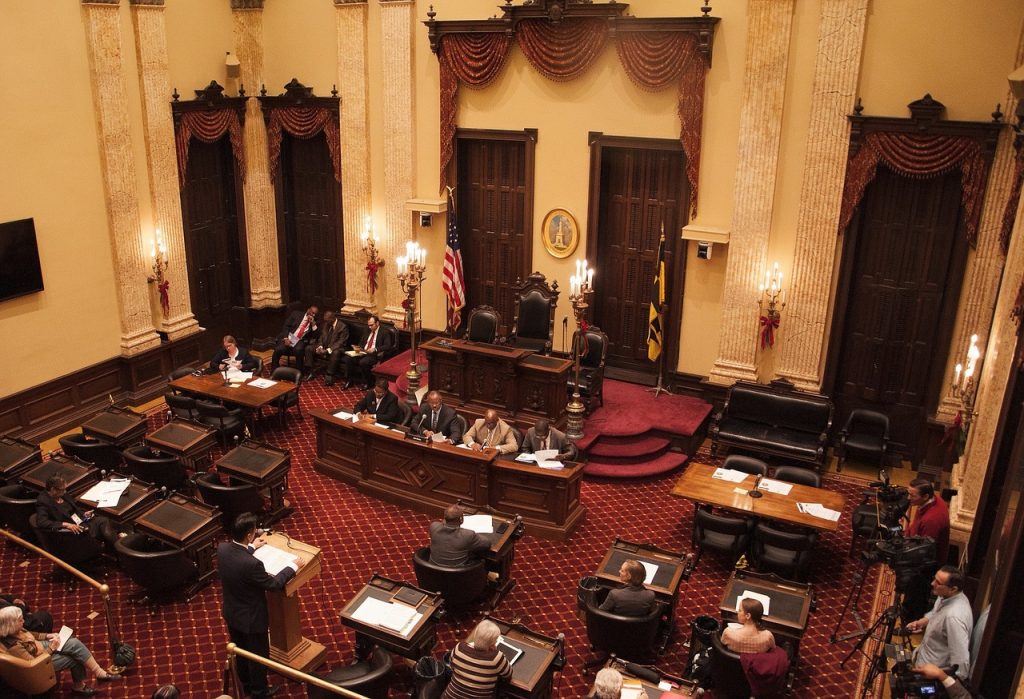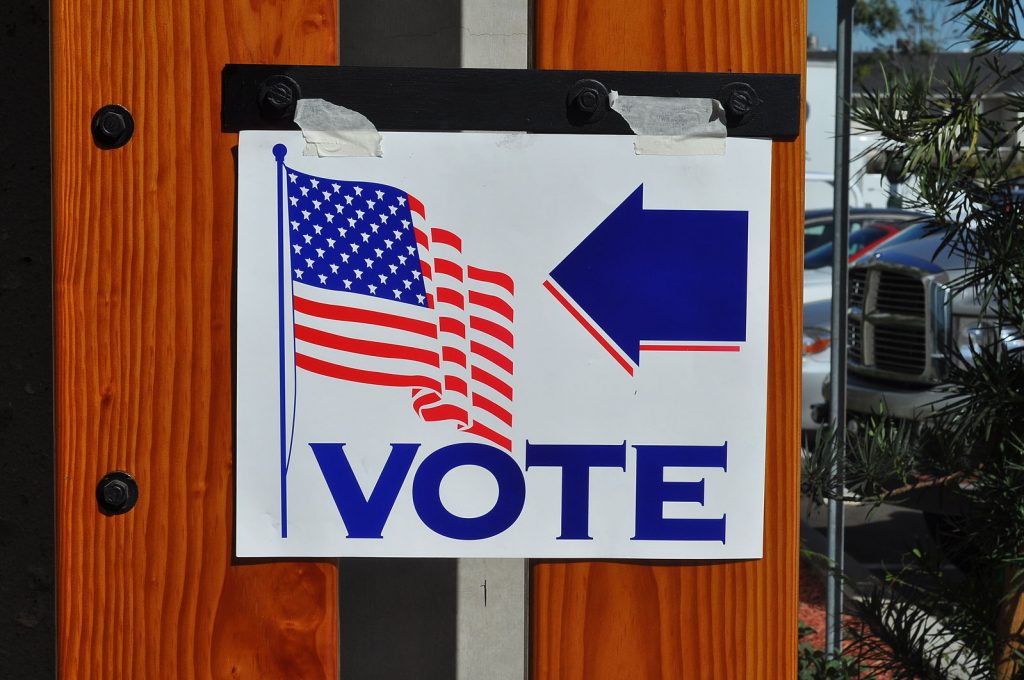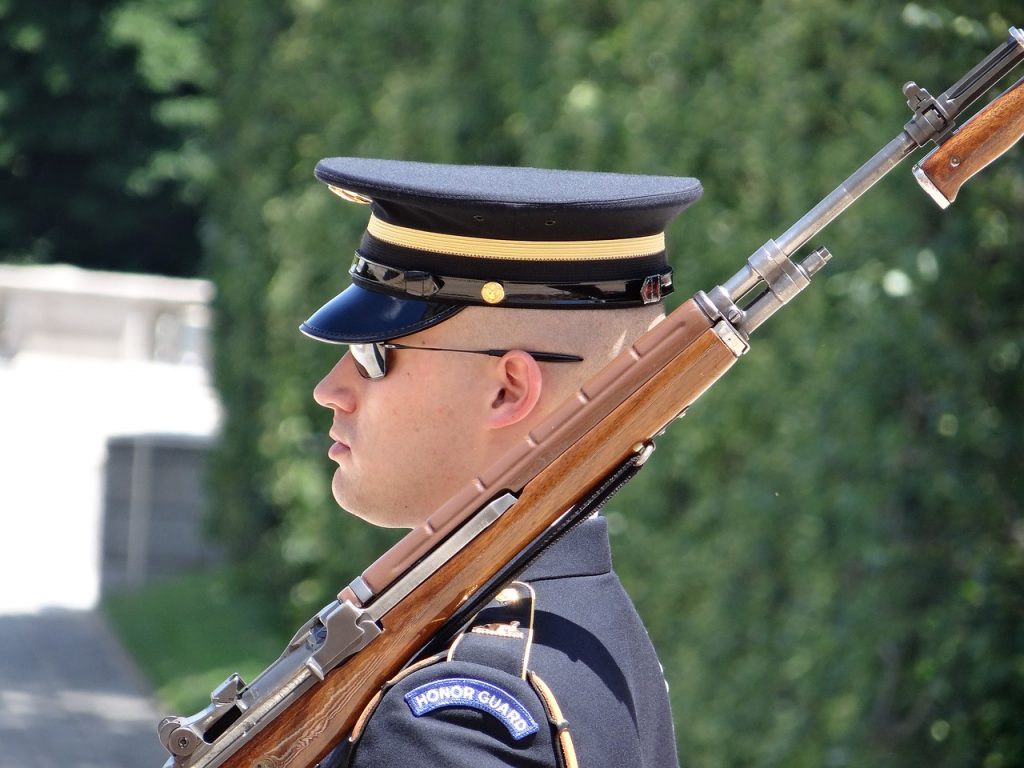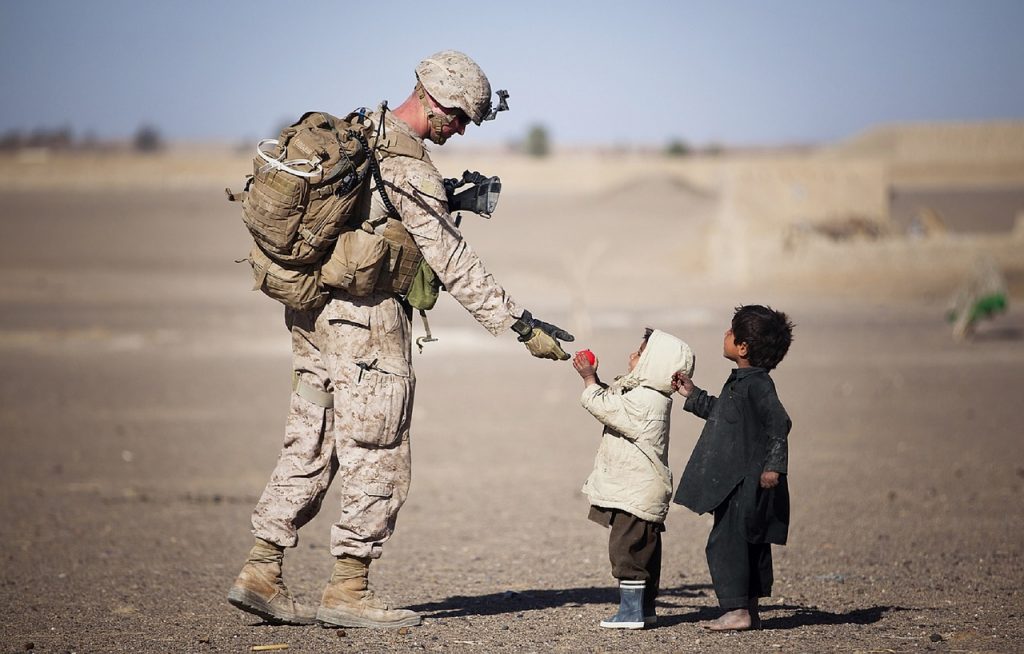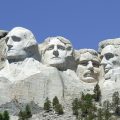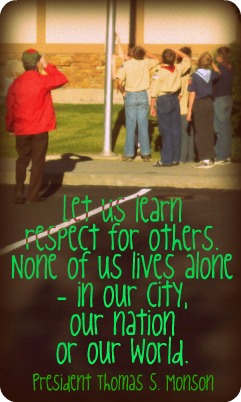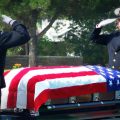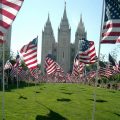November begins in the same way every two years—with a fight at the polls. Republicans vs. Democrats. Independents vs. Libertarians. It’s a battle mentality that seems to take over at election time. But then, within a week a two of exercising our right to vote, we honor our military veterans. It’s very apropos, as voting and veterans go hand in hand—there is a connection. And it’s not the combat or the divisions. It’s the people who are united in the cause of doing their duty as citizens of this nation.
The Church of Jesus Christ of Latter-day Saints (sometimes mistakenly called the Mormon Church), stated,
Citizenship works best as a partnership where people and governments cooperate to secure the common good. …
Citizenship, therefore, is an active participation in society that calls for engagement, not isolation. The root word civ fills our political language. Civilization, civic, civility, civilian, civil rights — they all point to how we treat one another in building a common enterprise. It’s a matter of culture more than law, duty more than demand.
The U.S. Citizen and Immigration Services stated,
Citizenship is the common thread that connects all Americans. We are a nation bound not by race or religion, but by the shared values of freedom, liberty, and equality.
And we must do our part to keep America as the land of the free and the home of the brave. This is the common element in both voting and veterans. And it begins with freedom of religion. Let me explain.
The Price of Freedom
The U.S. Citizens and Immigration Services put together a list of freedoms and responsibilities that American citizens enjoy. They are:
Freedoms:
Freedom to express yourself.
Freedom to worship as you wish.
Right to a prompt, fair trial by jury.
Right to vote in elections for public officials.
Right to run for elected office.
Freedom to pursue “life, liberty, and the pursuit of happiness.”
Responsibilities:
Support and defend the Constitution.
Stay informed of the issues affecting your community.
Participate in the democratic process.
Respect and obey federal, state, and local laws.
Respect the rights, beliefs, and opinions of others.
Participate in your local community.
Pay income and other taxes honestly, and on time, to federal, state, and local authorities.
Serve on a jury when called upon.
Defend the country if the need should arise.
They are simple, yet how many of us have reflected on the importance of them? This is the price that we pay for our freedoms. And if we are unwilling to do our part, then our freedoms erode.
Foundation of Freedom
Freedom of religion is the foundation of a free society. Elder D. Todd Christofferson said,
…Religious freedom undergirds and is inseparably connected to all the other freedoms we cherish. It is the core right in what might be thought of as an “ecosystem” of freedom. As religious freedom goes, so go many other precious rights.
Religious freedom is bolstered by a separation of church and state. In fact, it is this separation that allows each to flourish but not overtake. Elder Christofferson continued,
Dividing the authority of church and state had the powerful effect of establishing limits to the authority of both. Government came to be understood as inherently limited—its legitimate authority simply does not include matters of religious belief or practice, for those are matters of the soul. By the same token, while churches have legitimate authority over matters of religious belief and practice, they lack civil power over property or life. Governments do not rule churches, and churches do not rule governments….
That is a profound notion that we often take for granted. … There are inherent limits to both governmental and religious authority over society, and in the tensions and spaces created by those limits we find many of our freedoms.
How does that work? Elder Christofferson explained,
Religious freedom erects an effective shield for other freedoms. Religious freedom presumes there are important areas of life beyond the legitimate power of government. A government powerless to compel religious belief or exercise will be hard pressed to compel orthodoxy in other areas of life. Religious freedom protects the freedom of individual belief and expression in all areas of human activity. This enables people to develop and express their own opinions in matters of philosophy, politics, business, literature, art, science, and other areas, which naturally leads to social and political diversity.
A Primer in Civics
This is kind of a long way to say that if we want to maintain our freedoms, we have to protect not only our rights but the rights of others. We have to be good citizens. Author Peter Block wrote,
A citizen is one who is willing to be accountable for and committed to the well-being of the whole. That whole can be a city block, a community, a nation, the earth. A citizen is one who produces the future, someone who does not wait, beg, or dream for the future. [Peter Block, Community: The Structure of Belonging (San Francisco: Berrett-Koehler Publishers, 2008), 63.]
This is where religious freedom comes in. Elder Christofferson taught,
Religious freedom is the cornerstone of peace in a world with many competing philosophies. …. It allows diverse beliefs to coexist, protects the vulnerable, and helps us negotiate our conflicts. Thus … religious freedom is vital to people of faith and “is also a precious asset for atheists, agnostics, sceptics and the unconcerned.” This is because “the pluralism indissociable from a democratic society, which has been dearly won over the centuries, depends on it.”
… We use our freedom of religion and belief to establish our core convictions, without which all other human rights would be meaningless. How can we claim the freedom of speech without being able to say what we truly believe? How can we claim the freedom of assembly unless we can gather with others who share our ideals? How can we enjoy freedom of the press unless we can publicly print or post who we really are?
Belief in Action
Religion has another role in citizenship: promoting civil order and prompting us to act. Elder Wilford W. Andersen said,
Societies depend in large part upon religion and churches to establish moral order. Government can never build enough jails to house the criminals produced by a society lacking in morality, character, and faith. These attributes are better encouraged by religious observance than by legislative decree or police force. It is impossible for government to control the attitudes, desires, and hopes that spring from the human heart. And yet these are the seeds that grow into the conduct government must regulate. …
Civility in society is achieved when the majority of people do what is moral because they believe they should, not because they are compelled by law or by police force.
Government oversees the conduct of its citizens. It tries to get them to behave in a decent and moral way. Religion, on the other hand, tries to get them to desire to behave in a decent and moral way.
This desire to behave in a decent and moral way leads to action. Elder Andersen continued,
Over time all free governments must ultimately depend on the voluntary goodness and support of their citizens. …
To that end, good government protects religion and fosters religious freedom. And good religion encourages good citizenship and adherence to the law of the land.
It is a symbiotic relationship that is coming under increasing scrutiny and attack—which is a threat to all of our freedoms.
Doing Democracy
Our freedoms are individual, but we must work together for everyone to benefit. This begins with talking and listening to others. There is a library program in my little town called “Doing Democracy.” The goal of this program is to “promot[e] dialogue about issues that face our community … by creating a culture of civil discourse that allows for multiple perspectives, creative conflict, and the discovery of common ground.” It is a community dialogue on relevant topics that need to be addressed with an apropos title: “Doing Democracy,” or democracy in action.
That is how we not only find common ground but also hash out what is the best option for everyone. Elder Quentin L. Cook said,
… All voices need to be heard in the public square. Neither religious nor secular voices should be silenced. Furthermore, we should not expect that because some of our views emanate from religious principles, they will automatically be accepted or given preferential status. But it is also clear such views and values are entitled to be reviewed on their merits.
We will not always agree, but we can always be civil. David Axelrod, former chief strategist and senior advisor to President Barack Obama, said,
It’s OK that we disagree. That’s democracy. That’s the way our system was set up. …
I think the worst thing that’s happened to our country is this notion that we can’t disagree without being disagreeable. That we can’t disagree on issues without trying to dehumanize our opponents or disqualify them as patriots and Americans.
Name-calling and dehumanizing opponents shuts down the dialogue, blocking true efforts to work together and accomplish our goals.
The Right to Vote
Voting is our obligation and duty as American citizens who are eligible to do so. But the percentage of those of us who do vote is awful. In the 2016 presidential election, only 56% of the U.S. voting-age population voted, according to the Pew Research Center. That means that a little more than half of eligible voters are making their voices heard. Why is this important? Brian Miller, executive director of the nonprofit VOTE, explained,
High voter turnout and civic participation are central to a healthy democracy. …
With low-turnout, the broad public opinion on issues fails to be represented, as campaign strategies and ground games target a limited number of base voters that can more easily turn elections in their favor. It contributes to a more polarized politics and leaves out the important voices of youth or new citizens who are disproportionately overlooked by campaigns and not encouraged to participate.
At a local level, the act of voting grows from and helps foster healthier and more engaged communities. Compared to non-voters, voters are more likely to volunteer, contact their elected officials, and stay informed about local affairs. Additionally, they are more likely to contribute to their neighborhood’s “social capital” and live in communities where neighbors are in contact with one another.
In other words, voters get more involved. They feel more responsible for their communities, states and nation. Axelrod stated,
I urge you not to turn away from this political process which can be so discouraging at times. … Whatever it is that you care about, … you can either turn away and leave those decisions to someone else, or you can lean in and demand a better kind of politics, politics that is based in honest debate and mutual respect.
We can make a difference in politics by being involved in it.
To Stand in Defense
Good citizenship also requires us to stand in defense of our country and our beliefs. For some that means literally taking up arms and putting their very lives in danger as members of the Armed Forces. It is a sacrifice for the men and women who wear the uniform as well as their loved ones back home. There is a monument dedicated to our marines at Guadalcanal. Of this monument, Maurice L. Stocks, at the time assistant dean in the Marriott School of Management at Brigham Young University, said,
Many of the young men who fought in this World War II battle were killed. “When you go home,” the monument reads, “tell them, and say, ‘For their tomorrows, we gave our today.’”
This sense of service and sacrifice—which our citizens have displayed so often in our history—is a key, I believe, to the greatness of this wonderful country. In … hometowns across America, there are men and women from our past wars and military experiences who were ready to make the ultimate sacrifice for their country and their comrades. Many of their fellow sailors, soldiers, and airmen did, indeed, make that sacrifice and now rest in graves—marked and unmarked—throughout the world.
I have to confess that I never directly faced a situation in my air force career in which I felt that I was in mortal danger. But, like most military men and women, I’ve been personally touched by the great heroism and selfless sacrifice of many others in uniform. I feel wonderfully blessed to be a part of this great university, but I will never regret the 29 years I spent in the uniform of my country.
The People Behind the Uniform
Veterans Day is personal for me because I have many family members who served in the military and fought in battle. I watched my brother go off to war—in multiple deployments—and worried and prayed for his safe return. They are people, with feelings and families, who are doing their duty to serve their country. Stocks said,
Most of us have an image of military leaders as cold, calculating men and women ready to fight at any provocation, aching to use their military skills and abilities. I found exactly the opposite in the military. First, as aide-de-camp and then as executive officer or personal assistant to two four-star generals—and later as a senior staff member in both the Tactical Air Command and the Air Combat Command—I found individuals who, like Moroni, “did not delight in bloodshed” (Alma 48:11). Because they had experienced it firsthand, they felt that even one death was too many and strongly supported reasoned, negotiated solutions to international problems over military intervention. Most of these individuals were also people of faith who, in their own way, celebrated the blessings emanating from their Creator. When it came time to fight, they were—and will be—there. But I can tell you from firsthand experience that it is a mistake to see these leaders as lovers of war. They know the price that will be paid by their comrades and perhaps by themselves as well.
It is this service and sacrifice that we honor on Veterans Day.
Voting and Veterans
Citizenship requires that we look out for each other and not just ourselves. Stan A. Taylor, at the time a political science professor at Brigham Young University, said,
Being part of a community or society requires respect for others and a willingness to restrain one’s own desires to support broader community goals and aspirations. Unwillingness to make this sacrifice results in a corrosion of shared values. Members of a community in which individualism and personal goals are pursued at the expense of community goals are driven to look out for their own self-interests, knowing that no one else will look out for those interests for them, to paraphrase the French philosopher Rousseau. Rousseau wrote critically of the anarchy created by the unrestrained pursuit of self-interests. In such a society or community, the public good is gradually driven out by individual goals, and, eventually, the very nature of the community is changed.
This is why it’s so important to do our part by volunteering in the community, participating in community dialogue, being involved in the political process, voting and serving our country. President James E. Faust said,
One of the highest duties of citizenship is to defend one’s country. This is because in wartime military service often demands the ultimate sacrifice—life itself.
We may not have to give our lives, but we can live our lives in a way that honors the sacrifice of those who have gone before us and protects the future of those who will come after. Which is the highest duty of every citizen.

